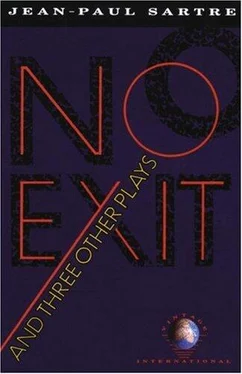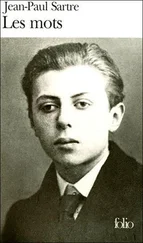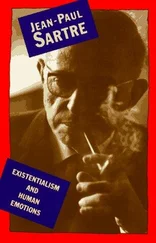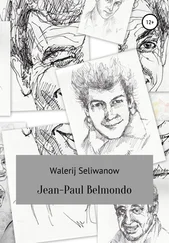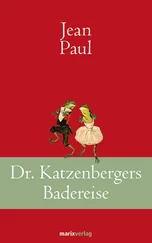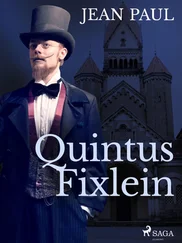GARCIN: That's simple. I'd rescued her from- from the gutter.
ESTELLE: You see! You see!
INEZ: Yes, I see. Look here! What' s the point of play-acting, trying to throw dust in each other's eyes? We're all tarred with the same brush.
ESTELLE: How dare you!
INEZ: Yes, we are criminals- murderers- all three of us. We're in hell, my pets; they never make mistakes, and people aren't damned for nothing.
ESTELLE: Stop! For heaven's sake-
INEZ: In hell! Damned souls- that's us, all three!
ESTELLE: Keep quiet! I forbid you to use such disgusting words.
INEZ: A damned soul- that's you, my little plaster saint. And ditto our friend there, the noble pacifist. We've had our hour of pleasure, haven't we?
There have been people who burned their lives out for our sakes- and we chuckled over it. So now we have to pay the reckoning.
GARCIN: Will you keep your mouth shut, damn it!
INEZ: Well, well! Ah, I understand now. I know why they've put us three together.
GARCIN: I advise you to- to think twice before you say any more.
INEZ: Wait! You'll see how simple it is. Childishly simple. Obviously there aren't any physical torments- you agree, don't you? And yet we're in hell. And no one else will come here. We'll stay in this room together, the three of us, for ever and ever…In short, there's someone absent here, the official torturer.
GARCIN: I'd noticed that.
INEZ: It's obvious what they're after- an economy of man-power- or devil-power, if you prefer. The same idea as in the cafeteria, where customers serve themselves.
ESTELLE: Whatever do you mean?
INEZ: I mean that each of us will act as torturer of the two others.
GARCIN: No, I shall never be your torturer. I wish neither of you any harm, and I've no concern with you. None at all. So the solution's easy enough; each of us stays put in his or her corner and takes no notice of the others. You here, you here, and I there. Like soldiers at our posts. Also, we mustn't speak. Not one word. That won't be difficult; each of us has plenty of material for self-communings. I think I could stay ten thousand years with only my thoughts for compnay.
ESTELLE: Have I got to keep silent, too?
GARCIN: Yes. And that way we-we'll work out our salvation. Looking into ourselves, never raising our heads. Agreed?
INEZ: Agreed.
ESTELLE: I agree.
GARCIN: Then-good-by.
(Inez sings to herself while Estelle has been plying her powder-puff and lipstick. She looks round for a mirror, fumbles in her bag, then turns toward Garcin.
ESTELLE: Excuse me, have you a glass? Any sort of glass, a pocket-mirror will do. (Garcin remains silent.) Even if you won't speak to me, you might lend me a glass.
INEZ: Don't worry. I've a glass in my bag. It's gone! They must have taken it from me at the entrance.
ESTELLE: How tiresome! (Estelle shuts her eyes and sways, as if about to faint. Inez runs forward and holds her up.)
INEZ: What's the matter?
ESTELLE: I feel so queer. Don't you ever get taken that way? When I can't see myself I begin to wonder if I really and truly exist. I pat myself just to make sure, but it doesn't help much.
INEZ: You're lucky. I'm always conscious of myself- in my mind. Painfully conscious.
ESTELLE: Ah yes, in your mind. But everything that goes on in one's head is os vague, isn't it? It makes one want to sleep. I've six big mirrors in my bedroom. There they are. I can see them. But they don't see me. They're reflecting the carpet, the settee, the window- but how empty it is, a glass in which I'm absent! When I talked to people I always made sure there was one near by in which I could see myself. Iwatched myself talking. And somehow it kept me alert, seeing myself as the others saw me…Oh dear! My lipstick! I'm sure I've put it on all crooked. No, I can't do wihtout a looking-glass for ever and ever. I simply can't.
INEZ:Suppose I try to be your glass? Come and pay me a visit, dear. Here's a place for you on my sofa.
ESTELLE: But-(points to Garcin)
INEZ: Oh, he doesn't count.
ESTELLE: But we're going to -to hurt each other. You said it yourself.
INEZ: Do I look as if I wanted to hurt you?
ESTELLE: One never can tell.
INEZ: Much more likely YOU'LL hurt ME. Still, what does it matter? If I've got to suffer, it may as well be at your hands, your pretty hands. Sit down. Come closer. Closer. Look into my eyes. What do you see?
ESTELLE:Oh, I'm there! But so tiny I can't see myself properly.
INEZ:But I can. Every inch of you. Now ask me questions. I'll be as candid as any looking-glass.
ESTELLE: Please, Mr. Garcin. Sure our chatter isn't boring you?
INEZ: Don't worry about him. As I said, he doesn't count. We're by ourselves…Ask away.
ESTELLE: Are my lips all right?
INEZ: Show! No, they're a bit smudgy.
ESTELLE: I thought as much. Luckily no one's seen me. I'll try again.
INEZ: That's better. No. Follow the line of your lips. Wait!! I'll guide your hand. There. That's quite good.
ESTELLE: As good as when I came in?
INEZ: Far better. Crueler. Your mouth looks quite diabolical that way.
ESTELLE: Good gracious! And you say you like it! How maddening, not being able to see for myself! You're quite sure, Miss Serrano, that it's all right now?
INEZ: Won't you call me Inez?
ESTELLE: Aree you sure it looks all right?
INEZ: You're lovely, Estelle.
ESTELLE:But how can I rely upon your taste? Is it the same as my taste? Oh, how sickening it all is, enough to drive one crazy!
INEZ: I HAVE your taste, my dear, because I like you so much. Look at me. No, straight. Now smile. I'm not so ugly, iether. Am I not nicer than your glass?
ESTELLE: Oh, I don't know. Your scare me rather. My reflection in the glass never did that; of course, I knew it so well. Like something I had tamed…I'm going to smile, and my smile will sink down into your pupils, and heaven knows what it will become.
INEZ: And why shouldn't you "tame"me? Listen! I want you to call me Inez. We must be great friends.
ESTELLE: I don't make friends with women very easily.
INEZ:Not with postal clerks, you mean? Hullo, what's that- that nasty red spot at the bottom of your cheek? A pimple?
ESTELLE: A pimple? Oh, how simply foul! Where!
INEZ:There…You know the way the catch larks- with a mirror? I'm your lark-mirror, my dear, and you can't escape me…There isn't any pimple, not a trace of one. So what about it? Suppose the mirror started telling lies? Or suppose I covered my eyes-as he is doing- and refused to look at you, all that loveliness of yours would be wasted on the desert air. No, don't be afraid, I can't help looking at you. I shan't turn my eyes away. And I'll be nice to you, ever so nice. Only you must be nice to me, too.
ESTELLE: Are you really- attracted by me?
INEZ: Very much indeed.
ESTELLE: But I wish he'd notice me too.
INEZ:Of course! Because he's a MAN! You've won. But look at her, damn it! Don't pretend. You haven't missed a word of what we've said.
GARCIN: Quite so; not a word. I stuck my fingers in my ears, but your voices thudded in my brain. Silly chatter. Now will you leave me in peace, you two? I'm not interested in you.
INEZ: Not in me, perhaps-but how about this child? Aren't you interested in her? Oh, I saw through your game; you got on your high horse just to impress her.
GARCIN: I asked you to leave me in peace. There's someone talking about me in the newspaper office and I want to listen. And, if it'll make you any happier, let me tell you that I've no use for the "child," as you call her.
ESTELLE: Thanks.
GARCIN: Oh, I didn't mean it rudely.
ESTELLE: You cad!
GARCIN: So that's that. You know I begged you not to speak.
ESTELLE: It's her fault; she started. I didn't ask anything of her and she came and offered me her-her glass.
Читать дальше
